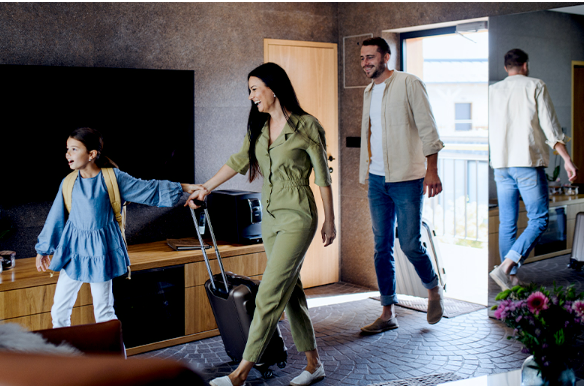As of September last year, there were 251,000 short-term rentals registered across Australia, down from 400,000 pre-pandemic.
However, not all short-term stays are registered. If you rent out your main residence, this article is for you. We’re sharing a swag of tips to help you manage your risks.
Understanding property insurance
To help protect your home from multiple risks, you can take out building insurance (if you own the premises) and home contents cover. Often the policies are bundled together for your property.
Your home’s physical structure, plus fixtures, is what building insurance covers. Fixtures typically include:
TV mounts
Built-in wardrobes
Shelving units and cupboards
Solar panels
Clothesline
Plugs and sockets
Ceiling fans and air conditioning units
Floor and wall tiles, fixed carpets
Inground swimming pool
Plumbing and heating systems
Kitchen and bathroom units
Light fixtures and other permanently wired electrical appliances.
Meanwhile, contents insurance generally covers the rest, including fittings and possessions, such as:
Furniture
Whitegoods
Curtains and rails, blinds
Ovens/stoves
Standalone barbecue
Outdoor TV or stereo.
Policies can vary though, so be sure to check with us. Generally, insured events include natural disasters, theft, fires and legal liability.
How home-sharing impacts personal property insurance
If you share your abode, then standard home and contents insurance may not be suitable. It comes down to what your insurer regards as ‘occasional’ stays and what you declare as your principal residence.
Typically, occasional means accommodation for one day to six months at a time with no tenancy agreement. Some home and contents policies exclude coverage for longer home-sharing.
Or, if you’re a renter and have housemates, for instance, they’d have to all be parties to the same insurance policy. But the odd insurer will offer individual cover for shared homes. If you opt for that, it will only cover your items anywhere on the property, but not your housemates’ possessions. Of course, if your housemates steal or damage your belongings, the policy won’t cover that.
Insurers tend to consider you a’ host’ if you use a platform or go private to share part or all of your main residence for a fee. That’s whether or not you’re living in the home at the same time as your guest.
That’s distinct from being a landlord. Landlord insurance would be appropriate when you don’t live in the property, and it’s not your principal residence, but you lease it out either long or short-term. Landlord cover is for holiday homes and investment properties, so can be for any length of time.
Home-sharing platforms, such as Airbnb, Stayz, and Homestay etc., may offer you guarantees or insurance to bridge the gap in cover.
Another option to give you more peace of mind is to consider extending your cover.
Additional coverage options (short-term stay)
Short-term rental insurance applies if you only let out your residence for short stays and not while you’re also living there. So, it’s not your principal place of residence. It’s the right cover for short-stay accommodation rented through a real estate agent or platform. These accommodation types include:
Holiday house
Serviced apartment
Investment property.
A short-term rental policy generally covers:
The building structure, including fittings
Contents – fittings and fixtures
Non-fixed items (e.g., bicycles, furniture, books, appliances, beds, barbecues etc.)
Insured events, including glass breakage, theft, fire, water or storm damage
Accidental or malicious damage
Cancelled bookings due to damage by a tenant or an insured event
Legal liability should guests become injured on the property.
Next, we’ll offer suggestions on risk management that complement a short-term stay insurance policy.
Tips for home-sharing hosts
These tips come from the Sydney-based Padlifter, a global marketplace of short-term rental service providers. Here’s how to make home-sharing safer for you and your guests:
Have keyless door locks so you don’t need to be present when a guest arrives. This lessens the risk of lost, copied, shared or damaged keys
Create an emergency exit plan with relevant emergency services phone numbers. Make the plan part of your welcome pack, and affix copies to the front, back and bedroom doors of your home
Install fire-safety devices, including smoke detectors, fire extinguishers and blankets. Store flammable cleaning products and aerosol cans away from flames
Check your state or territory’s tenancy laws (such as this one for NSW) about the need to do annual smoke alarm and gas safety checks
Stock up the first aid kit, ensure it’s accessible and point out its location to guests. This helps protect you against their claims of negligence or liability
Provide house rules about acceptable behaviour
Invest in security monitoring gear such as door and window sensors, noise level monitoring, etc.
Only communicate with guests via the private messaging platform if you’re using one.
We’re here to help!
Talk to us to clarify you have the coverage and protection you need. Contact us below!

